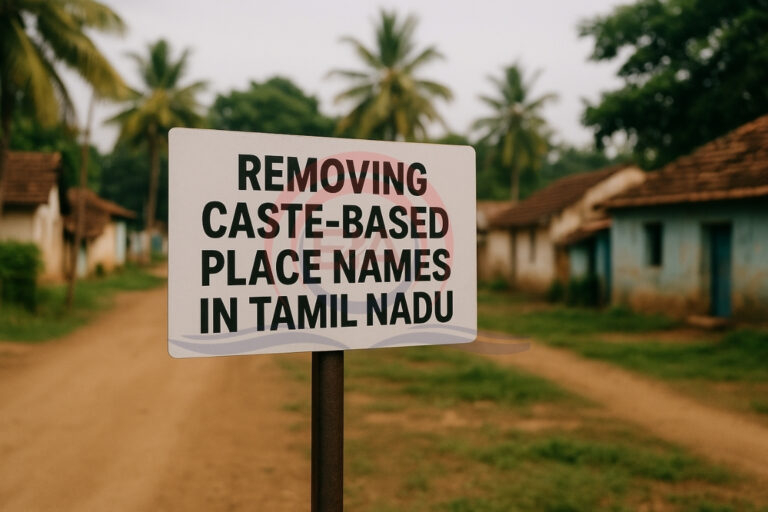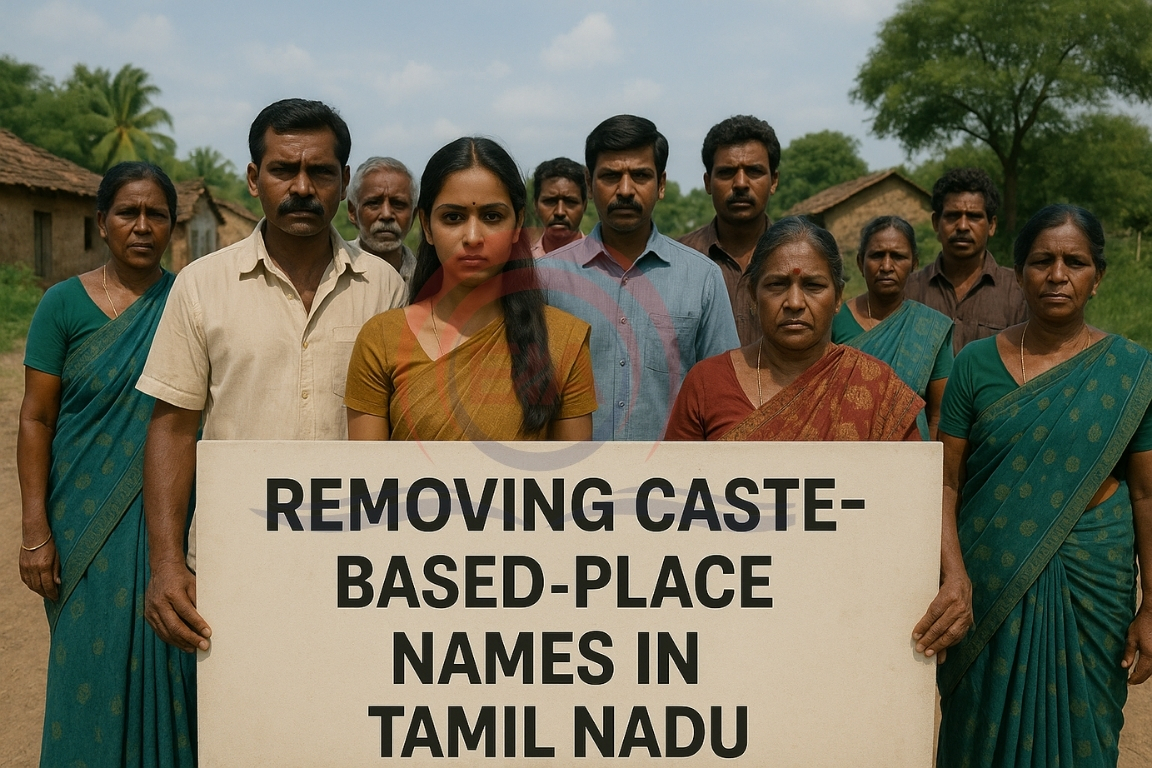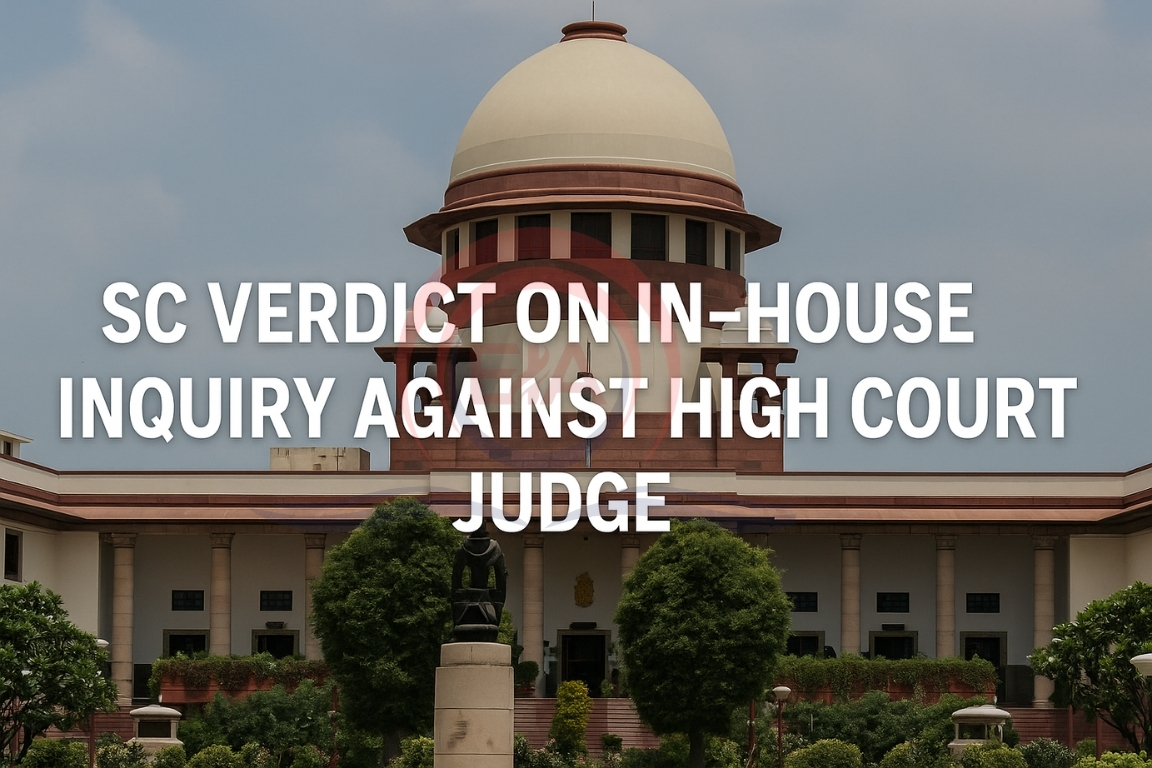On April 29, 2025, the Tamil Nadu Chief Minister announced that village names ending with “colony” or containing derogatory caste references (e.g., Pallappatti, Paraiyappatti, Naavidhan Kulam, Sakkilippatti) will be removed from State records. The move aims to eliminate caste-based stigma linked to place names in rural areas.
Background of the Issue
- In rural Tamil Nadu, words like colony and chery have historically been linked to Dalit settlements, carrying a social stigma and reinforcing untouchability.
- Segregation of lower castes into separate habitations emerged around the 12th century CE and continued through various political regimes.
- Over time, terms like Cheri Street, Harijan Colony, and Adi Dravidar Colony became derogatory identifiers.
Historical Context of the Words
- Ancient Usage of ‘Chery’: In early Tamil literature (e.g., Tolkappiyam, Kurunthokai), chery meant a common settlement with no caste connotation.
- By the medieval period, theendachery (“untouchable settlement”) emerged, reflecting caste segregation.
- Evolution of ‘Colony’: Originally referred to elite European residential areas during colonial times.
- In rural Tamil Nadu, the meaning shifted to describe Dalit habitations, creating a symbolic marker of exclusion.

Caste Segregation Through History
- Bhakti Movement & Chola Period (12th century): Temple-centric settlements deepened social divisions.
- Vijayanagar & Nayakka Rule (14th–17th centuries): Varnashrama segregation enforced harshly.
- British Period: Official records preserved derogatory caste-linked names.
Social Impact of Stigmatized Place Names
- Address details on documents (Aadhaar, voter ID, passports) reveal caste identity.
- Leads to discrimination in social interactions and official dealings.
- Causes psychological distress among marginalized communities.
Past Efforts to Address Caste Stigma in Names
- Mahatma Gandhi: Used “Harijan” for dignity, but the term became a label for ghettoisation (Harijan Colony).
- Iyothee Thass & M.C. Rajah: Promoted “Adi-Dravidar” as a neutral identity, but it too became socially loaded.
Government’s Current Approach
- Rename rural areas with caste-linked names after flowers, poets, or scientists.
- Avoid naming after political leaders.
- Urban colonies (e.g., Railway Colony, Saibaba Colony) not targeted, as they lack caste bias.
Significance of the Move
- Symbolic yet historic step toward social integration.
- Reduces everyday reminders of caste hierarchy.
- Supports the vision of a socially cohesive and progressive society.
WHAT IS SOCIAL STIGMA?
- Definition: Social stigma is a negative perception or label society attaches to individuals or groups based on certain characteristics — such as caste, disease, gender, occupation, or religion.
- Effect: Leads to exclusion, prejudice, and discrimination, which limits access to opportunities and social mobility.
Example: Dalits being denied entry into temples, manual scavengers facing social boycott, HIV-positive persons being ostracized.
WHAT IS ELIMINATION OF SOCIAL STIGMA?
- The process of removing prejudices, stereotypes, and discriminatory practices so that all individuals are treated with dignity and equality.
- Requires legal measures, social reforms, awareness campaigns, and economic empowerment.
Constitutional & Legal Measures
- Articles 14, 15, 16, 17 – Equality before law, prohibition of discrimination, abolition of untouchability, reservation in jobs and education.
- Scheduled Castes and Scheduled Tribes (Prevention of Atrocities) Act, 1989 – Punishes caste-based violence and discrimination.
- Protection of Civil Rights Act, 1955 – Penalises acts of untouchability.
Educational & Awareness Initiatives
- School curriculum reforms to promote constitutional values, empathy, and social harmony.
- Nationwide campaigns like ‘Samajik Samrasta Abhiyan’ to counter caste-based prejudice.
- Encouraging inter-caste dialogue and youth engagement for mindset change.
Economic Empowerment
- Skill training & entrepreneurship support for marginalised communities.
- Land reforms and better access to credit for SC/ST farmers and entrepreneurs.
- Prioritising SC/ST-owned businesses in government procurement.





